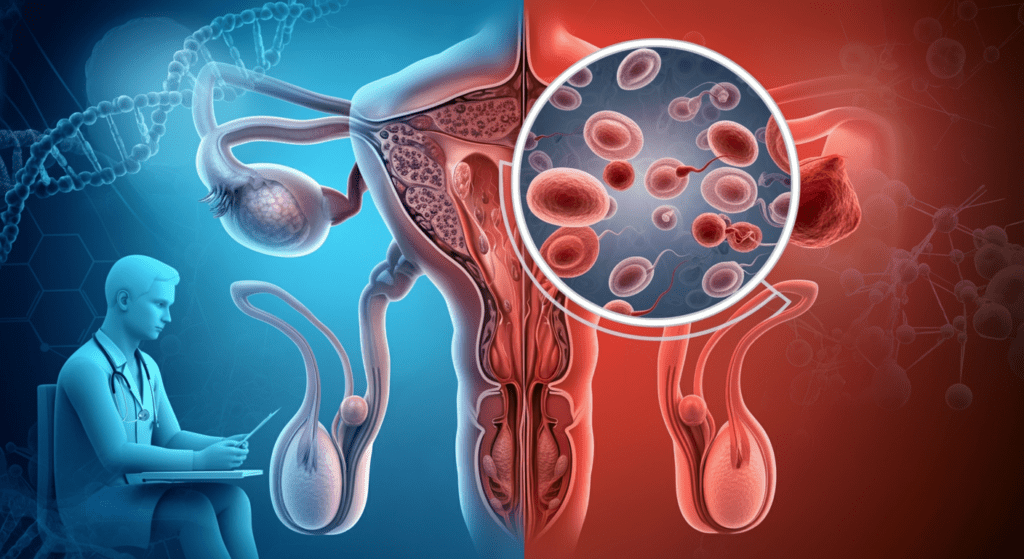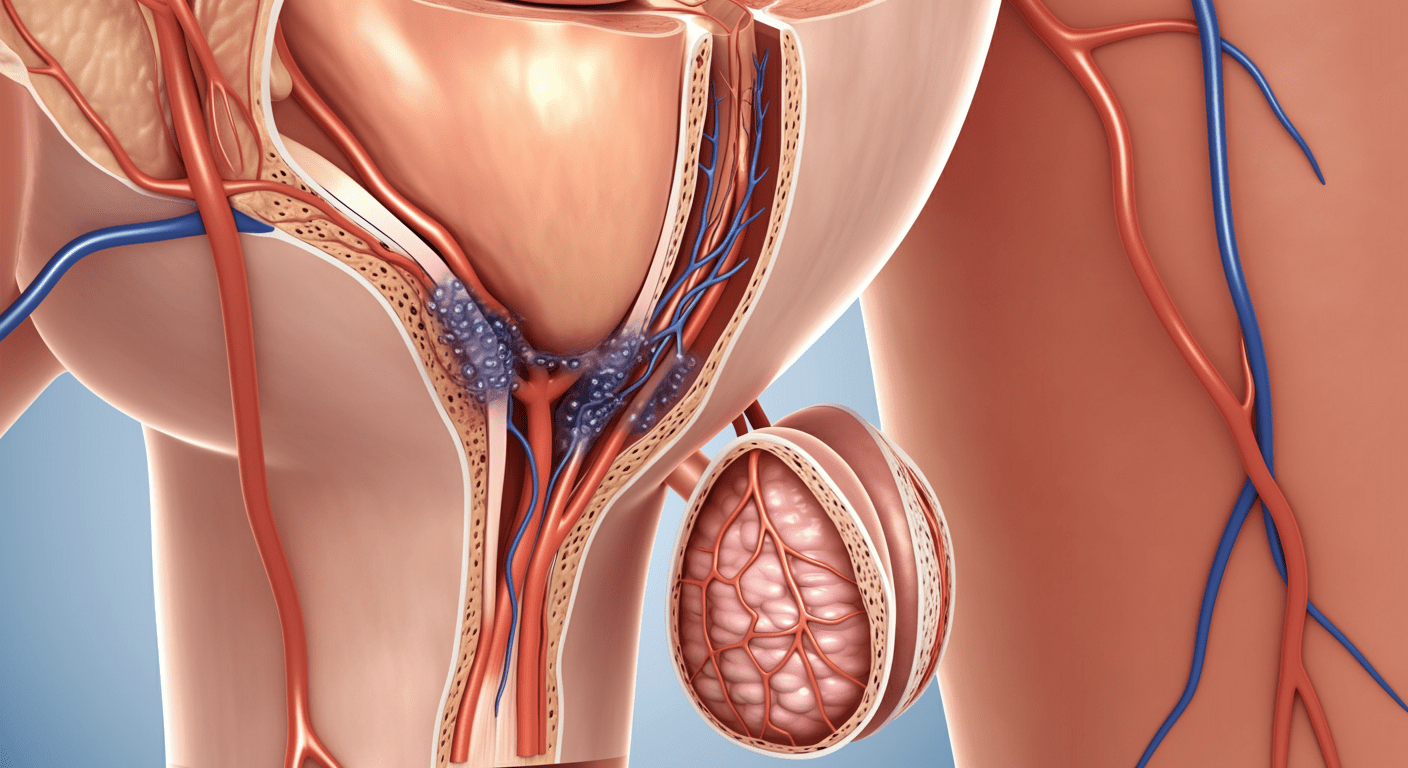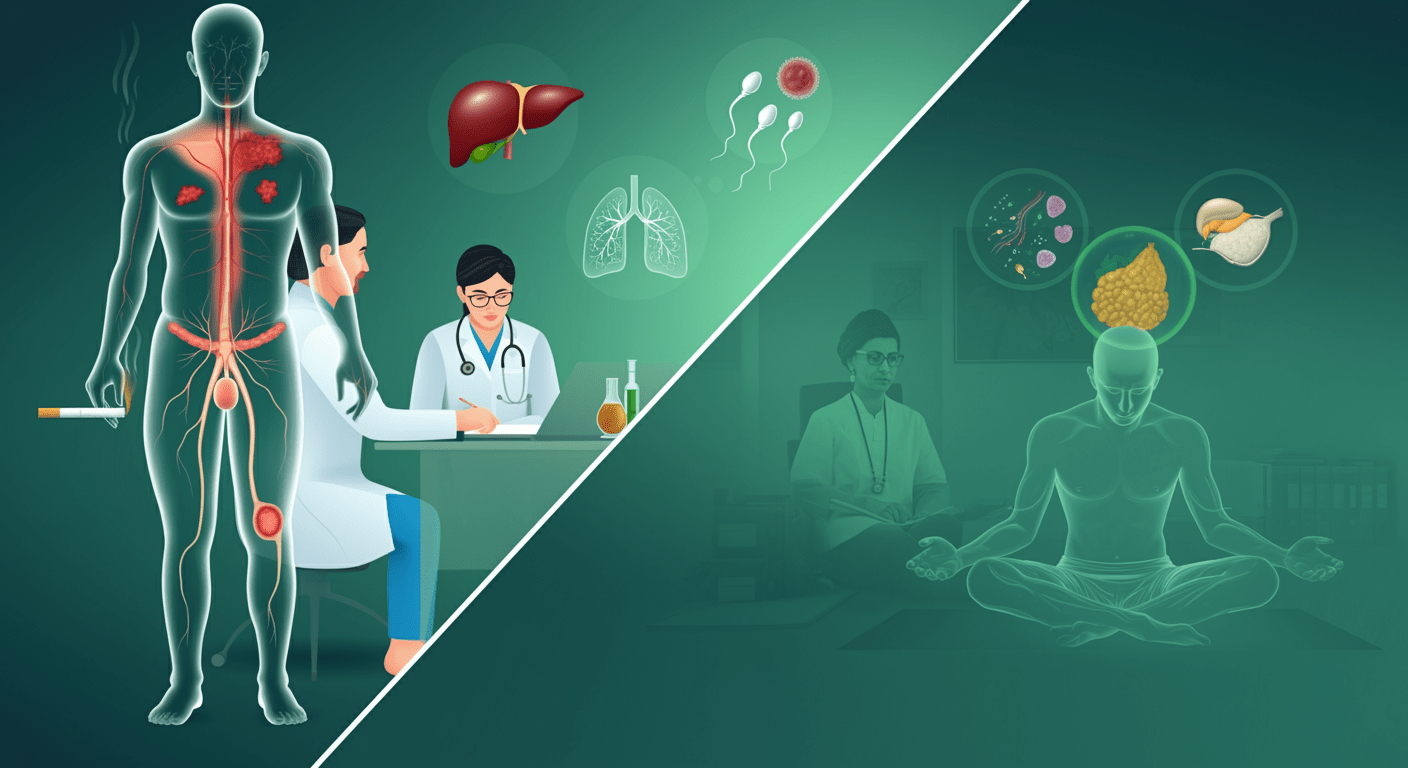Varicocele is a prevalent condition that can significantly influence male reproductive health. In this comprehensive article, we examine the various ways varicocele affect male fertility, from the underlying physiological mechanisms to its impact on sperm quality, hormonal balance, and overall testicular health.
An Overview of Varicocele
Varicocele is characterized by the abnormal enlargement of veins within the scrotum, much like the varicose veins seen in the legs. This condition is particularly common among younger men, typically affecting those between the ages of 15 and 25. Although many individuals remain unaware of their varicocele, its presence is one of the leading identifiable factors behind male infertility. Understanding this condition is crucial, especially since the way varicocele affect male fertility often goes unnoticed until reproductive challenges arise.
Defining Varicocele
Varicocele occurs when the valves within the veins responsible for draining blood from the testicles malfunction. This malfunction causes blood to pool, leading to dilated and twisted veins. The resulting increased blood flow raises the local temperature within the scrotum, which can interfere with the process of sperm production. It is precisely this disruption that explains how varicocele affect male fertility, by creating an environment that is less than ideal for optimal sperm development.
Prevalence and Contributing Factors
- Occurrence Rate: Approximately 15% of the male population may exhibit varicocele, with the prevalence rising to 40% among men facing infertility issues.
- Risk Contributors: Genetic predispositions, anatomical variances, and lifestyle choices can all contribute to the development of this condition.
Grasping the basics of varicocele is essential for anyone trying to understand how varicocele affect male fertility and for those looking to take proactive measures to safeguard their reproductive potential.
Mechanisms by Which Varicocele Affect Male Fertility
The ways in which varicocele influence male fertility are multi-layered. Research shows that several interrelated factors contribute to reduced sperm production and quality. In this section, we detail these mechanisms and how they collectively demonstrate that varicocele affect male fertility.
Elevated Scrotal Temperature
One of the primary effects of varicocele is an increase in scrotal temperature. The pooling of blood in the enlarged veins leads to a higher-than-normal temperature around the testicles. Since the process of sperm production is highly temperature-sensitive, even a slight rise in temperature can lead to decreased sperm count and diminished motility. This mechanism clearly illustrates how varicocele affect male fertility by creating conditions that are unfavorable for healthy spermatogenesis.
Oxidative Stress and Inflammation
Another significant factor is the induction of oxidative stress. The stagnation of blood flow in varicocele results in an accumulation of reactive oxygen species (ROS), which can damage cellular structures, including the DNA in sperm cells. Chronic inflammation associated with this condition further impairs sperm functionality. In effect, the way varicocele affect male fertility is partly through this oxidative and inflammatory stress, leading to reduced sperm viability.
Hormonal Disruption
Varicocele can also lead to imbalances in hormones that are critical for reproductive function. The condition may impair testosterone production and interfere with the hormonal signals necessary for sperm development. Lower testosterone levels and altered ratios of hormones like follicle-stimulating hormone (FSH) and luteinizing hormone (LH) can further explain how varicocele affect male fertility by hindering the body’s natural reproductive processes.
Diminished Testicular Function
In summary, the combined impact of increased scrotal temperature, oxidative stress, and hormonal disturbances culminates in impaired testicular function. This results in both a reduction in the number of sperm produced and a decline in their overall quality. It becomes evident that varicocele affect male fertility in a multifaceted manner that disrupts every critical aspect of sperm health.
Recognizing the Symptoms and Diagnostic Methods
While varicocele may be asymptomatic in many cases, certain signs and symptoms can indicate its presence. Recognizing these symptoms is vital for early diagnosis and management.
Common Warning Signs
- Dull or Persistent Pain: Many men report a dull ache or discomfort in the scrotum, especially after prolonged periods of standing.
- Heaviness in the Scrotum: Some individuals experience a sensation of heaviness or dragging in the scrotal area.
- Visible Vein Enlargement: On physical examination, varicocele may present as a network of enlarged veins, often described as resembling a “bag of worms.”
Diagnostic Techniques
- Physical Examination:
Physicians typically detect varicocele during a routine physical exam by palpating the scrotum while the patient is standing. - Ultrasound Imaging:
In cases where physical findings are ambiguous, a scrotal ultrasound can provide a clearer image of the affected veins and assess blood flow abnormalities. - Semen Analysis:
Evaluating sperm count, motility, and morphology via a semen analysis can help determine the extent to which varicocele affect male fertility.
Early detection is critical because understanding how varicocele affect male fertility allows for timely intervention and more effective management strategies.
Effects on Sperm Production and Quality

Varicocele has a direct impact on the parameters of sperm health, affecting several aspects that are critical for fertility. This section explores these impacts in detail.
Reduced Sperm Count
Men diagnosed with varicocele frequently exhibit lower sperm counts. The increased heat and oxidative stress interfere with the process of spermatogenesis, thereby reducing the overall number of sperm. This is one clear example of how varicocele affect male fertility by diminishing the body’s ability to produce sufficient viable sperm.
Decreased Sperm Motility
The motility, or movement capability, of sperm is crucial for fertilization. Varicocele-induced conditions can hinder the mobility of sperm, making it more difficult for them to navigate the female reproductive tract. Reduced motility is a significant factor in male infertility and further illustrates the myriad ways in which varicocele affect male fertility.
Abnormal Sperm Morphology
The structural integrity of sperm, known as morphology, is also compromised in many cases of varicocele. Abnormal shapes or sizes resulting from cellular damage can lower the chances of successful fertilization. Even if sperm counts are borderline normal, poor morphology can have profound implications, underscoring how varicocele affect male fertility at a cellular level.
Increased DNA Fragmentation
Emerging research points to higher rates of sperm DNA fragmentation in individuals with varicocele. DNA damage in sperm cells is associated with reduced fertility and may contribute to complications such as recurrent miscarriages or failed assisted reproductive techniques. This reinforces the understanding of how varicocele affect male fertility by undermining the genetic integrity of sperm.
Hormonal Influences and Varicocele
Hormonal balance plays a pivotal role in maintaining reproductive health. Varicocele can disrupt this balance, leading to significant repercussions on fertility.
Testosterone Reduction
Testosterone is a fundamental hormone for male reproductive health. Varicocele can impair the function of Leydig cells in the testes, which are responsible for producing testosterone. This reduction in testosterone not only compromises sperm production but also can affect libido and overall energy levels, illustrating yet another pathway by which varicocele affect male fertility.
Imbalances in FSH and LH
The production of sperm is regulated by hormones such as follicle-stimulating hormone (FSH) and luteinizing hormone (LH). Disruptions caused by varicocele can disturb the delicate balance of these hormones, further impacting spermatogenesis. Understanding these hormonal shifts provides additional clarity on how varicocele affect male fertility through multiple physiological pathways.
Treatment Approaches for Varicocele
Managing varicocele involves a range of treatment options, each tailored to the severity of the condition and its impact on fertility. Below, we discuss both non-invasive and invasive methods for addressing how varicocele affect male fertility.
Conservative Management
For men experiencing mild symptoms or minimal fertility issues, conservative measures may be sufficient. These strategies include:
- Observation and Monitoring:
Regular check-ups can help track the condition’s progression and its impact on fertility. - Lifestyle Modifications:
Adopting supportive undergarments, reducing prolonged standing, and avoiding activities that might exacerbate the condition can be beneficial. - Nutritional Supplements:
Incorporating antioxidants and other supplements may help mitigate oxidative stress, thereby indirectly addressing how varicocele affect male fertility.
Surgical Options
When conservative management is inadequate, surgical interventions are often recommended to improve fertility outcomes.
Varicocelectomy
- Procedure Details:
Varicocelectomy involves surgically ligating the affected veins. This can be performed using various techniques such as open surgery, laparoscopic methods, or microsurgery. Microsurgical approaches are particularly favored due to their precision and lower complication rates. - Fertility Outcomes:
Many studies suggest that varicocelectomy can lead to improvements in sperm count, motility, and overall quality, thereby mitigating the ways in which varicocele affect male fertility. However, results can vary depending on individual patient factors.
Embolization
- Minimally Invasive Approach:
As an alternative to surgery, embolization is a procedure performed by an interventional radiologist. During embolization, coils or sclerosing agents are used to block the affected veins, thereby reducing abnormal blood flow. - Advantages:
This method is less invasive and often preferred by patients seeking to avoid the risks associated with surgery. It is another valuable tool for addressing how varicocele affect male fertility.
Post-Treatment Care
Following treatment, patients are advised to limit strenuous activities and follow up with their healthcare providers. Regular semen analyses may be conducted to monitor improvements in fertility parameters. These post-treatment strategies are critical in ensuring that the interventions effectively reverse the ways in which varicocele affect male fertility.
Lifestyle Changes and Alternative Therapies

In addition to conventional treatments, lifestyle adjustments and alternative therapies can provide supportive benefits for men affected by varicocele.
Nutritional Adjustments
A diet high in antioxidants, vitamins, and minerals is beneficial for reproductive health. Foods such as leafy greens, fruits, nuts, and fatty fish can help combat oxidative stress and improve sperm quality. These nutritional choices are an essential aspect of countering how varicocele affect male fertility.
Regular Exercise and Weight Management
Engaging in moderate physical activity and maintaining a healthy body weight can enhance hormonal balance and improve circulation. These lifestyle choices not only promote overall health but also help offset some of the negative impacts of varicocele on fertility. However, it is important to avoid excessive exercise that might lead to further stress on the reproductive system.
Stress Reduction Techniques
Chronic stress can adversely affect fertility. Incorporating stress reduction methods such as yoga, meditation, and deep breathing exercises can create a more favorable environment for sperm production. This is another proactive step in managing how varicocele affect male fertility.
Alternative Supplements and Herbal Remedies
Natural supplements like Coenzyme Q10, L-carnitine, and zinc have shown potential in improving sperm parameters. While these remedies are not a cure-all, they can offer additional support when used in conjunction with conventional treatments, further addressing the ways in which varicocele affect male fertility.
Emerging Research and Future Perspectives
Ongoing research continues to enhance our understanding of varicocele and its multifactorial impact on male fertility. Below are some of the emerging trends and future directions in this field.
Genetic and Molecular Insights
Recent studies suggest that genetic factors may predispose certain individuals to varicocele, further influencing how varicocele affect male fertility. As genetic research advances, there is hope for more personalized treatment approaches that address the unique genetic makeup of affected individuals.
Innovations in Surgical Techniques
Advances in microsurgical procedures have led to higher success rates in varicocelectomy, reducing recovery times and minimizing complications. These innovations offer promising avenues for mitigating the negative impact of varicocele on fertility and provide clearer answers on how varicocele affect male fertility over the long term.
Long-Term Fertility Prognosis
Longitudinal studies are examining the long-term effects of various treatments on fertility outcomes. While some men experience substantial improvements post-treatment, others may continue to face challenges. Continued research in this area is critical to better understand which patients are most likely to benefit, and thereby how varicocele affect male fertility over an extended period.
Non-Surgical Interventions
In addition to surgical options, there is a growing interest in pharmacological and non-invasive therapies aimed at reducing oxidative stress and inflammation. These emerging treatments may soon provide effective alternatives for managing the ways in which varicocele affect male fertility without the need for surgery.
Dispelling Common Misconceptions
There are several myths and misconceptions about varicocele that can cloud judgment when it comes to managing male fertility. Addressing these misconceptions is important to set realistic expectations.
Myth 1: Varicocele Always Leads to Infertility
Not every man with varicocele will experience fertility problems. While it is a leading cause of male infertility, many men with the condition maintain normal sperm function and are able to father children naturally. It is important to understand that the degree to which varicocele affect male fertility can vary widely among individuals.
Myth 2: Surgery Is a Guaranteed Cure
Although surgical intervention such as varicocelectomy has been shown to improve sperm quality in many cases, it is not a universal cure. The success of the surgery depends on multiple factors, including the severity of the varicocele and the individual’s overall health. Thus, while surgery can help mitigate how varicocele affect male fertility, it does not guarantee complete restoration of fertility.
Myth 3: Lifestyle Changes Alone Are Ineffective
Some believe that lifestyle modifications cannot significantly counteract the adverse effects of varicocele. However, adopting a healthier lifestyle including a balanced diet, regular exercise, and stress reduction can indeed support reproductive health and improve sperm quality, thereby reducing the ways in which varicocele affect male fertility.
Practical Advice for Men Concerned About Fertility
For those diagnosed with varicocele or experiencing fertility challenges, the following recommendations offer practical steps to manage the condition:
- Seek Expert Consultation:
Schedule an appointment with a urologist or fertility specialist who can provide a personalized evaluation and treatment plan. - Regular Health Monitoring:
Keep track of your condition with periodic medical check-ups and semen analyses to assess how varicocele affect male fertility over time. - Adopt a Healthy Lifestyle:
Focus on nutritional choices, exercise, and stress management strategies that promote overall reproductive health. - Explore All Treatment Options:
Discuss both conservative and surgical options with your healthcare provider. Understanding the benefits and limitations of each can help you make an informed decision about how to best manage the ways in which varicocele affect male fertility. - Stay Informed on Research Developments:
Keep up with the latest research and emerging therapies. New treatments and insights are continually evolving, offering hope for even more effective management in the future.
Implementing these strategies can empower you to take control of your reproductive health and reduce the negative impact of varicocele on fertility.
Conclusion
The effects of varicocele on male fertility are complex and multifactorial. By exploring how varicocele affect male fertility through elevated scrotal temperature, oxidative stress, hormonal imbalances, and impaired testicular function, this article has provided a comprehensive understanding of the condition.
We have discussed the key mechanisms at play, from the reduction in sperm count and motility to the increased risk of DNA fragmentation. The impact on hormone levels particularly testosterone, FSH, and LH further elucidates how varicocele can undermine male reproductive capabilities. Moreover, the article has highlighted a range of treatment options, from conservative management to advanced surgical interventions like varicocelectomy and embolization, all aimed at counteracting the ways in which varicocele affect male fertility.
Practical lifestyle changes, including dietary improvements, regular exercise, and stress management, also play an essential role in mitigating these effects. Additionally, emerging research and innovations in both surgical and non-surgical therapies offer promising prospects for the future management of this condition.
Ultimately, understanding how varicocele affect male fertility empowers men to seek timely medical advice and adopt strategies that can significantly improve their reproductive outcomes. While varicocele remains a leading contributor to male infertility, advances in diagnosis, treatment, and lifestyle management provide hope for many affected individuals.
Final Thoughts
The journey to addressing male infertility due to varicocele is not one-size-fits-all. With an increasing body of research and continuous improvements in treatment methodologies, the future holds promise for more personalized and effective interventions. Whether you are just beginning to explore the causes behind fertility challenges or you have been dealing with varicocele for some time, staying proactive and informed is key.
This rephrased guide not only explains the various ways in which varicocele affect male fertility but also provides actionable insights and recommendations to help you navigate the condition. By understanding the underlying mechanisms, recognizing the symptoms early, and exploring all available treatment options, you can take control of your reproductive health and improve your fertility prospects.
Remember, while this article serves as an in-depth resource, it should complement—not replace—professional medical advice. Consulting with a qualified healthcare provider remains essential for personalized diagnosis and treatment planning.
By integrating these insights and practical recommendations, you are better equipped to understand and manage the challenges posed by varicocele. Embrace a proactive approach to health, stay updated with the latest research, and remember that even small changes can lead to significant improvements in how varicocele affect male fertility.
managing varicocele and its impact on fertility involves a multifaceted approach that combines medical treatment, lifestyle modifications, and ongoing research. With the right support and information, many men can overcome these challenges and achieve their reproductive goals.
Remember: While this article provides a detailed overview, it is not a substitute for professional medical advice. Always consult with a qualified healthcare provider to discuss your specific circumstances and treatment options.













